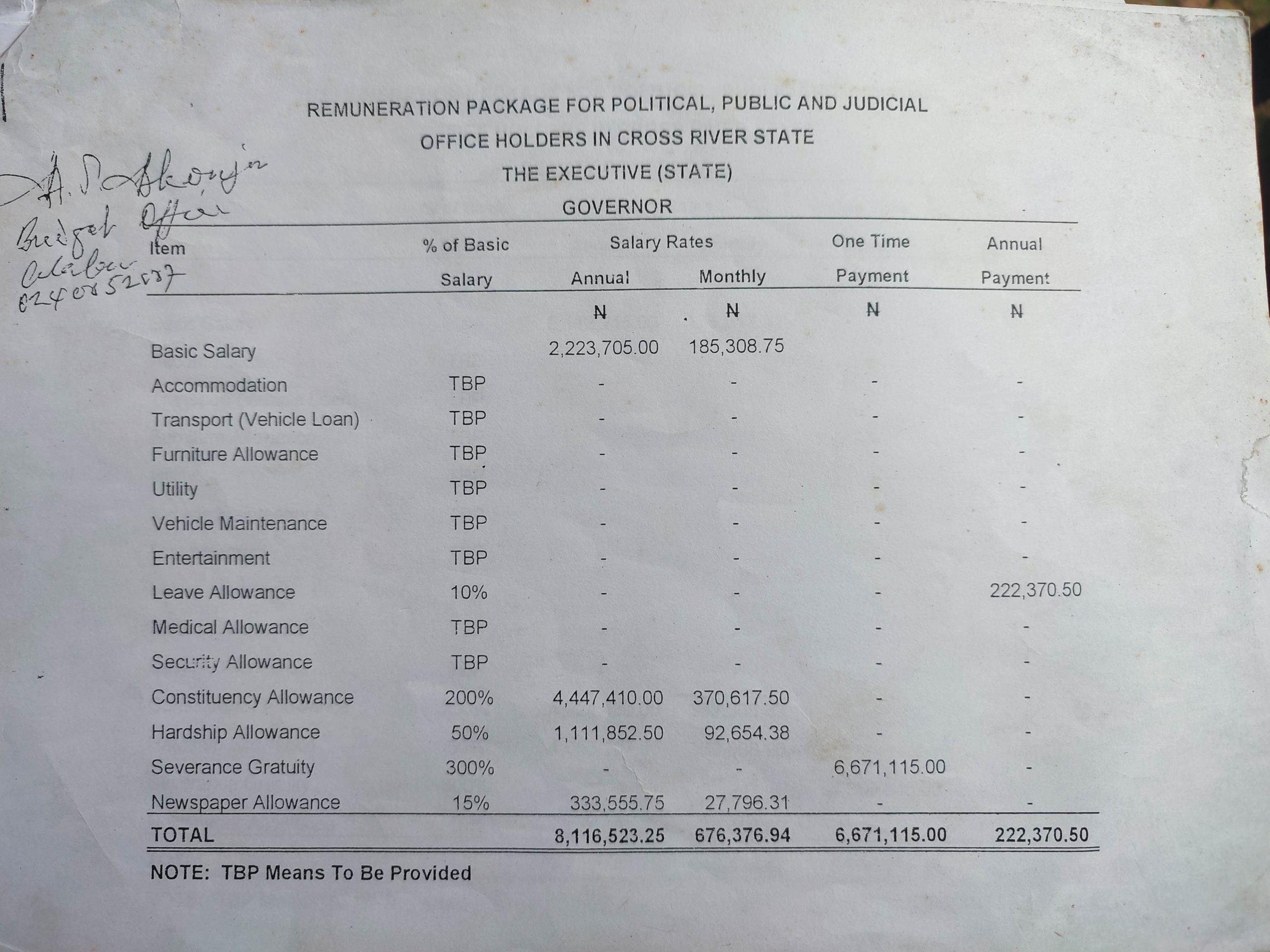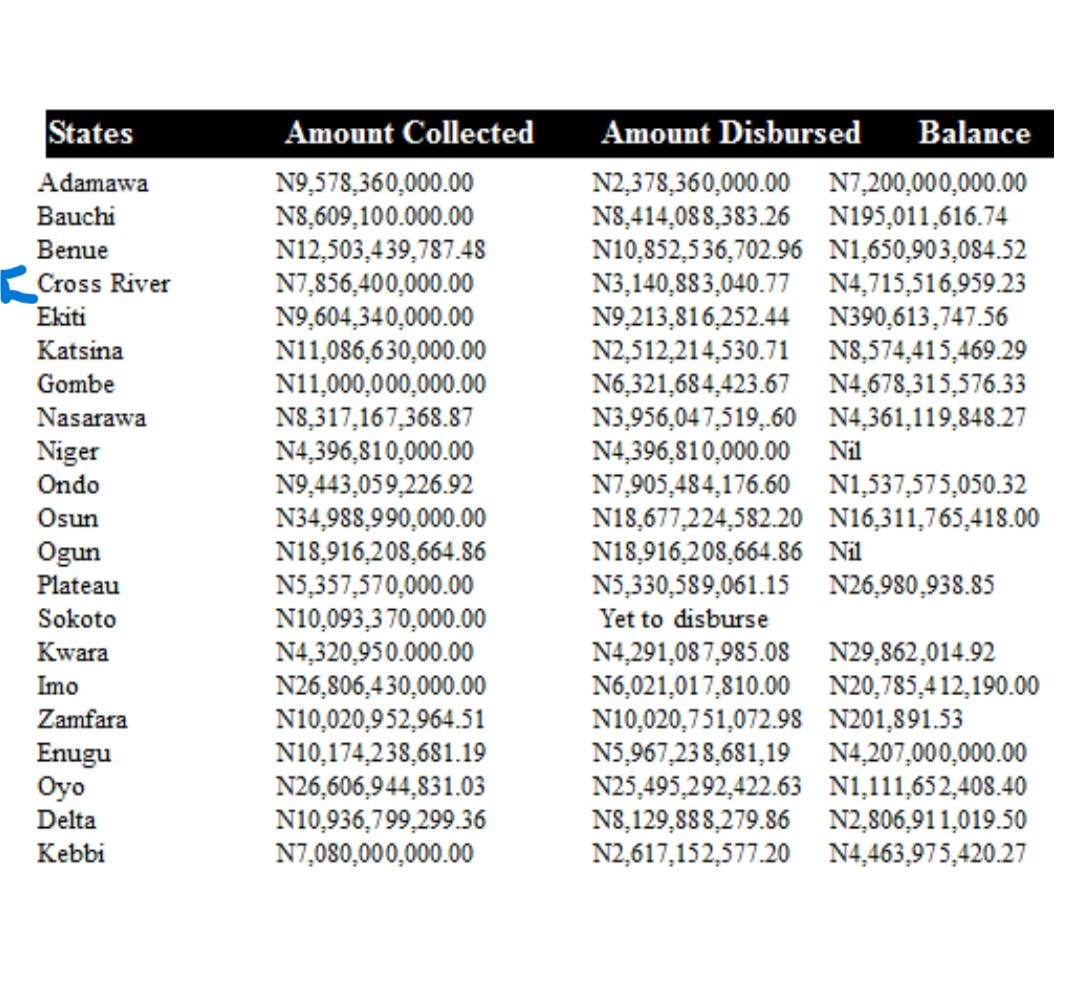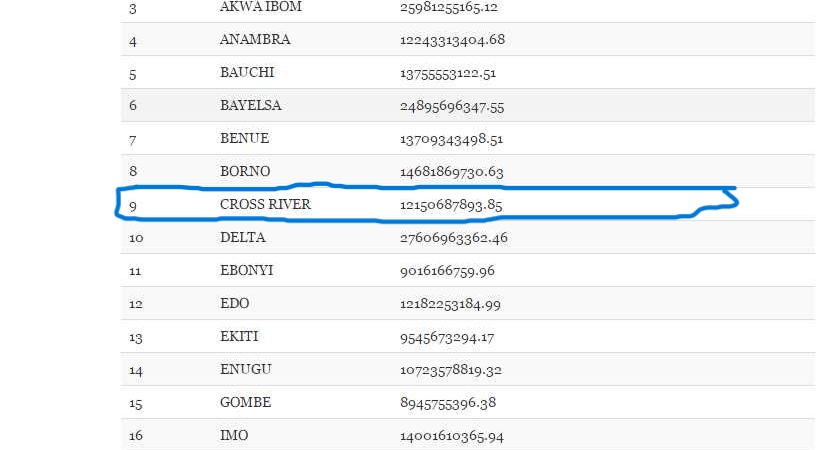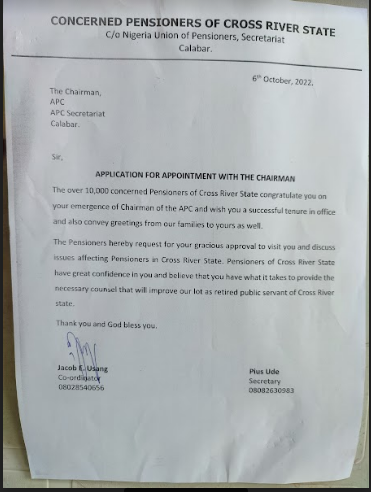By Arinze Chijioke
Upon the successful completion of his two terms of eight years as governor, Ben Ayade of Cross River State will receive 300 per cent of his annual basic salary as severance gratuity.
This is apart from other allowances like hardship, constituency allowance, newspaper, furniture, medical, security, entertainment and vehicle maintenance among others.
Meanwhile, five thousand retired civil servants in Cross River State have not been given their pension entitlements from the state government – a violation of section 210 of the 1999 constitution which concerns the protection of pension rights.
In February 2017, senior special assistant to President Muhammadu Buhari on prosecutions, Okoi Obono-Obla accused the Cross River State government of misappropriating N19 billion that it received as a bailout fund to pay outstanding salaries, pensions, and gratuities.

It goes back to 2015 when President Muhammadi Buhari had approved the sum of N338bn for 27 states as part of efforts to end the lingering problem of unpaid workers’ salaries, which had escalated into a crisis. Cross River State was given N7.8 billion in July 2016 and another N11.5 billion as bailout funds.


But a report on the monitoring of state bail-out funds released in 2016 by the Independent Corrupt Practices and Other Related Offences Commission, ICPC, and the Nigeria Labour Congress showed that the Cross River State misappropriated federal funds.
The report showed that out of the N7,856,400,000.00 it received, it had only disbursed N3,140,883,040.77 with a balance of N4,715,516,959,23, claiming not to have outstanding salaries for workers as of November 19, 2015.
Cross River State also received N19.25 billion, including 12.15 billion as the first tranche and N6.75 billion as the second tranche as Paris Club refund, a settlement of long-standing claims by state governments relating to over-deductions from their federation account allocation committee (FAAC) allocation to service the debts. Altogether, the state received over N38.2 billion as bailout and Paris Club refunds.

However, there is yet no explanation as to what the funds were used for. The Senate Committee on States and Local Government Administration and the Organised Labour have asked the government to explain how it expended the fund. The Cross River State chapter of the All-Progressives Congress (APC) had vowed to probe Ayade over the fund. That was before he moved into the party.

In 2017, the Economic and Financial Crimes Commission (EFCC) embarked on an investigation into how the Cross River State government applied the Paris Club loan refunds paid to it by the federal government. The commission has been contacted for comment.
In a swift reaction to the allegations by Obono-Obla in 2017, the chief press secretary to the Ayade, Christian Ita said that the bailout funds were still intact. “Not a kobo of the funds which are lodged in the state government account with the UBA has been touched, “he said. “The governor has directed that the funds be used to pay severance allowances to past political office holders and clear outstanding gratuity to retirees”.
Struggling To Get By
James Essien struggles to pay his apartment rent of N400,000 a year. Sometimes, he borrows more money than he earns from his pension to be able to pay rent and other dues. Whenever the money comes, he uses everything to pay for debt and starts borrowing again.
“We are helpless and hopeless, some of us have been forced to withdraw our children from school because they cannot pay their fees, “said Essien. “Some have terminal sicknesses, and they cannot take care of themselves”.
In 1979, when he started work in the civil service, Essien hoped that he would build a house for his family in the village and own a flourishing business upon retirement. In October 2014, 35 years later, he retired from the ministry of women’s affairs as the director of administration. As a director, he explained he was entitled to a gratuity of N6 million naira, which was supposed to come immediately after he retired.
But eight years after he left active service, Essien is yet to receive his gratuity. At 63, he only depends on his monthly pension of N135,000, which he says does not come regularly. Sometimes, he waits for two months before he gets one. His 32-year-old daughter was discharged this October after his children contributed N250,000 and paid her hospital bill. He could not afford the bills. She was losing blood.
“I look like a failure among some of my friends because I have nothing to show for the years I spent working for the state, “he said. “I looked forward to a better life after work”.
Essien hails from Ekori in Yakurr LG. He shares a two-bedroom apartment in a tree-lined estate in Calabar with one of his daughters and his wife.
To keep his family running, every month, Essien spends 75,000 on food, N6000 on light and N2000 on water. He also spends N4000 for his TV cable subscription service and N12,000 on fuel. Sometimes, he spends more, all from his irregular pension of N135,000.
The Sub Treasury of the office of the Accountant General of the state, which handles the verification and documentation for payment of pension and gratuity, Daniel, said that they usually receive complaints from retirees who are not paid even after they have been cleared.
“Most of them are old and sick, yet they come here in their thousands every year for screening and nothing changes,” he said. “A former Chief judge in the state once called to complain that he was yet to receive his pension since September”.
Between August 2016 and February 2017, the Association of Cross River State Local Government Pensioners claimed that 28 of their members died from circumstances related to financial challenges arising from the non-payment of their pension entitlements.
In Ekori, where James hails from, at least three retirees have died without receiving their entitlements. He said that retirees die because they cannot care for themselves. Out of 50 retired permanent secretaries, as of 11th August 2015, at least 12 have reportedly died without receiving their outstanding benefits.
Last year, an investigation revealed that after the state government had declared people ‘dead’ and stopped disbursing pensions, retirees were told to prove that they were still alive. A worker at the office of the state auditor-general said the office is now trying to resolve the issue of dead pensioners which was published by the accountant-general because some of them have come back to prove that they were not dead.
Several Protests, Little Results
On the morning of November 3 2020, about 50 retirees blocked the Murtala Mohammed Highway in the Calabar metropolis in protest over the non-payment of their wages.
The workers sat in the middle of the road, with their documents in their hands and some of them carrying placards that read: “Governor Ayade pay our pension and gratuities”, “pensioners are dying due to non-payment of pension and gratuities” and “Ayade harmonize pension”.
One year after, the workers protested again after their demands were unmet. This time, they blocked the entrance to the Calabar Government House as they protested the non-payment of their benefits by the state government.

Four years ago, they protested after six of their colleagues died because they could not afford money to pay hospital bills. Essien said that he was part of the protest at the government house that resulted in the payment of gratuities up till 2014. But since then, the government has looked away.
“We are waiting to see if the government will hear our cry,” he said. “Else, we will protest, this time with big banners at the airport so that everyone can see what we are passing through as retirees in the state,”.
In his reaction to the 2020 protest, Special Adviser Media and Publicity to Governor Ben Ayade, Christian Ita, said that no verified pensioner in the state or local government service was owed a pension. The state commissioner for local government Affairs, Stella Odey was also quoted as saying that every genuine pensioner would be paid once they undergo screening and are captured in the payroll.
This September, some of the retirees came together and set up a committee known as concerned pensioners of Cross River State to adequately represent the interest of the thousands of pensioners in the state.

On October 5, 2022, the committee wrote a letter to the governor detailing some of the issues affecting pensioners in the state, including illegal deduction from the irregular monthly pensions they receive, non-payment of gratuities from 2014-date, non-regularisation and harmonisation of pension and unpaid pension of workers who retired between 2020 and May 2021.

The governor’s office acknowledged six days after, on October 11, but has failed to deliver a response to date. They also wrote a letter on October 6, seeking an appointment with the state party chairman of the All-Progressives Congress, APC Alphonsus Ebe. But he is yet to grant their request. APC is Ayade’s party.
Ayade’s Monthly N50 Million Sinking Fund Is Not Enough
In November 2021, Ayade established what he described as a sinking fund to enable him to set aside a minimum of 30 to 50 million nairas monthly from the budget to be used in addressing the issue of gratuity for retired civil servants in the state. It was to take effect in January 2022.
This was followed by the signing of a memorandum of understanding between the government, organised labour and the Cross River State Traditional Rulers’ Council.
Five months later, the head of service in the state, Timothy Ogbang Akwaji inaugurated a nine-man committee made up of the government and labour to oversee the disbursement of N200 million said to have been released by the state governor for payment.
However, while Akwaji claims that the state government has been consistent with the payment, several pensioners who spoke to said that they were yet to receive any payment.
In an October letter, the pensioner’s committee alleged that the disbursement of N50 million allocated monthly to offset gratuity is ‘shrouded in secrecy even as those in charge are partial in their selection of people to receive payment.
The committee said that rather than pick members from retirees- if there was a need because the accountant general already had the details of everyone- to properly represent the interest of everybody, the government chose civil servants who are not transparent in the disbursement.
Millions For Jeeps
One of the pensioners who prefers not to be mentioned said that the non-payment of gratuity and inconsistent pension payment is not because of lack of funds but because governor Ayade has demonstrated a lack of priority for retirees in his use of public funds.
In 2018, for instance, there were reports of how the governor bought jeeps that cost millions of naira for each of the eighteen paramount rulers in Cross River State. “The same traditional rulers had cars which were given to them by the government and are still in good condition, “he claimed.
This July, the governor bought Toyota land Cruiser Prado Sports Utility Vehicles (SUVs) for three members of the house of representatives who defected from the People’s Democratic Party, PDP to the All Progressives Congress (APC).
Also, in 2020, there were reports of how he gave out 54 SUVs to chairmen, their deputies and leaders of 18 local government councils. The SUVs consist of 18 Ford Edges for chairmen, 18 Ford Escapes for Deputies and 18 Ford EcoSport (Council Leaders).
He also gifted vehicles to newly-appointed judges in the state as a way of “appreciating the judges for standing with the truth” and promising to make improvements on their welfare.
During a thanksgiving in August this year, the Catholic Bishop of Uyo Diocese, John Ebebe Ayah, rejected Ayade’s N25 million donation and asked him to use it and pay the salaries of workers in the state.
“But each time he sees the wage bill, he expects it to reduce and forgets that others are retiring and entering into the list,” the pensioner said. “He is gifting cars when pensioners in his state can hardly afford to eat”.
A Weak Union
Retired secondary school teacher Peter Ude expected the Nigerian Union of Pensioners to speak up for people like him – he’s a registered member of the local chapter.
But, he says, the union has failed.
It has not held a meeting in the last five years, although Rule 13 of the constitution and code of conduct of the NUP asserts that all state and local branches should hold general meetings at least twice a year to hear the grievances of members.
Two years after retiring in 1996, Ude moved on to work on the board of internal revenue and in 2021, he retired from the ministry of land as a planning and research statistics staff.
Ude alleged that the union was aware of certain percentages amounting to over N75 million deducted from the monthly pensions between April and August, adding that it only exists to collect the 1 per cent check-off dues, which every pensioner pays and is deducted automatically every month.
“After the government stopped remitting to the union, they went ahead to deduct another 1 per cent from pensions, “he said. “We have spoken to them about the deductions, but they claim to be unaware of it, same with the auditor general and the accountant general.
He hoped that after retiring, his four children would get jobs and cater for him. In addition to that, he planned to use his gratuity to start up a business and earn additional income.
But the reality is far different.
His children are back at home, with no jobs. He does not have anything to fall back on. No gratuity. His pension of N125,000 which should come in every month does not come.
“We all depend on the pension for survival, “he said.
Six months before he retired, Ude said that the state government trained them on various entrepreneurship skills as an exit policy but never provided grants to support the skills earned.
More Cause For Alarm
A report released by the National Pension Commission, PenCom and titled ‘status of implementation of the Contributory Pension Scheme’ (CPS) shows that as of June 2021, the Cross River state government was yet to commence funding of retiree’s accounts through the contributory pension scheme, thereby failing to domesticate the 2014 Pension Reform Act.
The CPS was intended to, among other things, provide a soft landing for retirees while also relieving the states of the burden of having to pay pensions to retired civil servants from the treasury.
The report, however revealed that while the state had only drafted a bill on the scheme, it was yet to, among other things, enact a law on the CPS to guide its implementation, establish a pension Bureau, register employees with the Pension fund administrator and commence remittance of pension contributions for the employees.
Of the 25 states that keyed into the CPS, only five, including Lagos, FCT, Osun, Kaduna, and Delta states, have been outstanding in the monthly remittance of both the employees’ and employers’ portions of the contributions.
This means that as more employees retire, they are being pushed into old-age poverty while workers still in active service gear up to retire into poverty. A former head of Corporate Communications, PenCom, Peter Aghaghowa said that the autonomy that states enjoy over their pension schemes remains a challenge bedevilling its smooth operation.
“Unfortunately, it is the workers that will bear the consequences of the default in remitting pension contributions because whatever benefit they are going to get at retirement is dependent on what is in the retirement savings account, “he was quoted as saying.
Fighting Outrageous Pension Laws
Since the return to democracy in 1999, Nigerian governors, who spend a maximum of eight years in office, have taken millions of taxpayers’ naira monthly in form of pensions.
In the twilight of his tenure in 2014, Governor Godswill Akpabio of Akwa Ibom State initiated a controversial bill law that will enable him and other former governors to pocket N200 million in annual pension. The bill was passed, despite the criticism that greeted it.
However, some state governments have been making efforts to cut pensions. Last year, the Lagos state house of assembly approved a 50 per cent reduction of pension paid to former governors after Babajide Sanwo-Olu, the governor, submitted a bill to abolish the Public Office Holder (Payment of Pension Law 2007), including the removal of the law which provides houses in Abuja and Lagos for former governors who were also entitled to six new cars every three years.
Last year, a bill seeking to amend the law on pensions for former governors and their deputies and grant guaranteed life pensions for former governor and their deputies, including their spouses generated controversy in Enugu State.
After protests and public outcry, the state House of Assembly suspended the amendment of the executive bill, which had scaled the first reading and billed for the second reading.
We Are Committed To Paying Gratuities – Government
When contacted for comments, Cross River State head of service, Akwaji, said that the state government has been working to clear outstanding payments, which are in the region of N18 billion.
He confirmed that the state government sets aside N50 million naira monthly, and everybody can’t be paid simultaneously. He was responding to allegations that some retirees were being side-lined.
He explained that sometimes, there are delays in the pension payment because the inflows don’t match up with the commitment. On the issue of non-remittance to the contributory pension scheme, he said that the state government was still fine-tuning the aspect of the pension reform act, which made the pension administrators king over the contributors.
“We must domesticate it and in doing that, we want to make the contributors king because there is no point why you do your contributions and when you retire, they say you cannot access your money till you are a certain age, “he said. “We want to be sure it will benefit our workers”.
State chairman of NUP, Comrade Emmanuel Adie said that the union was working to tackle the issues affecting pensioners in the state, adding that it is also being discussed at the national level.
A Push For Reform
Head of Transparency International (Nigeria), Auwal Musa Rafsanjani, said that corruption remains the major reason why state governors deprive retired civil servants of their legitimate entitlements. He said that Cross River and other states have failed to provide audited reports of how they expended the bailout funds because there is no mechanism for effectively monitoring and evaluating the use of the funds, so he’s been pushing for an investigative hearing.
TI is processing pensioners’ complaints, but according to Rafsanjani, the key to real reform in the system is more transparency and accountability for the management of funds.
“Unfortunately, we have lawmakers who are unwilling to push for the reforms, “he said. “At the state level, assembly members have become political puppets in the hands of governors,” he said.
Meanwhile, back in Calabar, Essien has no idea when he will get the pension that he deserves.
This report was produced with support from Tiger Eye Foundation and the MacArthur Foundation.
Names of some sources have been changed for fear of victimization.

Leave feedback about this